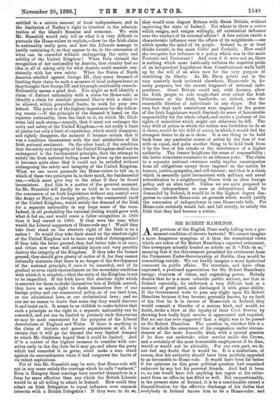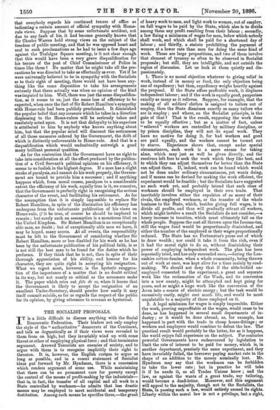SIR ROBERT HAMILTON.
A"portions of the English Press really falling into a per- manent condition of chronic hysteria? We cannot imagine a more dangerous symptom of it than the sensational views- which are taken of Sir Robert Hamilton's expected retirement.. One newspaper actually headed an article on it " Felo de Be,"
meaning that if the Government permitted his retirement from the Permanent Under-Secretaryship at Dublin, they would be committing suicide. We can hardly imagine a more hysterical comment on public affairs. We entertain, and have often expressed, a profound appreciation for Sir Robert Hamilton's 'energy, clearness of vision, and organising power. Nobody .doubts that he is a most valuable public servant, nor that in Ireland especially, he undertook a very difficult task at a• moment of great peril, and discharged it with great ability. If the Government were to pass any slight upon Sir Robert Hamilton because it has become generally known, by no fault of his, that he is in favour of Home-rule in Ireland, they would commit a blunder of a serious kind, and would, no doubt, strike a blow at the loyalty of their Civil Service by showing how badly loyal service is appreciated and requited. But no one has ever suggested that a slight was to be passe& on Sir Robert Hamilton. The question is, whether this is a time at which the acceptance of his resignation under circum- stances of the most honorific kind, with a special pension if he does not undertake other service under the Crown, and a certainty of the most honourable employment if he does, would or would not be advisable. For our own part, we do not feel any doubt that it would be. It is a misfortune, of course, that his authority should have been publicly appealed to as favourable to Home-rule. It would have been far better if his opinions on this great political question had remained unknown by any but his personal friends. And had it been so, no one would have felt anything but regret at his retire- ment from an office he has filled so well. But unquestionably, in the present state of Ireland, it is to a considerable extent a disqualification for the effective discharge of his duties that everybody in Ireland knows him to be a Home-ruler, and that everybody regards his continued tenure of office as indicating a certain amount of official sympathy with Home- rule views. Suppose that by some unfortunate accident, not due to any fault of his, it had become generally known that Sir Charles Warren held strong views on the subject of the freedom of public meeting, and that he was opposed heart and soul to such proclamations as he had to issue a few days ago against the Trafalgar Square meeting, is it not clear enough that this would have been a very grave disqualification for his tenure of the post of Chief Commissioner of Police in times like these ? No matter that he might take all the pre- cautions he was directed to take as effectually as ever. Yet if he were universally believed to be in sympathy with the Socialists as to their right of meeting, there would not have been any- thing like the same disposition to take his arrangements seriously that there actually was when no opinion of the kind was imputed to him. Well, there was just the same disqualifica- tion, as it seems to us; just the same loss of efficiency to be expected, when once the fact of Sir Robert Hamilton's sympathy with Home-rule had been publicly proclaimed. It diminished the popular belief that any measure which he takes in a direction displeasing to the Home-rulers will be seriously taken and resolutely acted upon. It is not that disloyalty to his superiors is attributed to him by anybody who knows anything about him, but that the popular mind will discount the seriousness of all those measures ordered by the Government, the drift of which is distinctly unfavourable to Home-rule. And that is a disqualification which would undoubtedly outweigh a good many brilliant personal qualities.
As for the contention that the Government have no right to take into consideration at all the effect produced by the publica- tion of a Civil Servant's political opinions on his efficiency, it seems to us foolish in the highest degree. If a man has a slight stroke of paralysis, and cannot do his work properly, the Govern- ment are bound to provide him a successor ; and if anything happens which, from moral causes, paralyses to a considerable extent the efficiency of his work, equally true is it, we conceive, that the Government is perfectly right in recognising the serious character of the event, and facilitating his retirement. As for the assumption that it is simply impossible to replace Sir Robert Hamilton, in spite of the diminution his efficiency has undergone from the unfortunate publication of his views on Home-rule, if it be true, of course he should be implored to remain ; but surely such an assumption is a monstrous libel on the United Kingdom. Sir Robert Hamilton is an exceptionally able man, no doubt ; but of exceptionally able men we have, it may be hoped, many scores. At all events, the responsibility must be left to the Government of considering whether Sir Robert Hamilton, more or less disabled for his work as he has been by the unfortunate publication of his political faith, is or is not still the best man to be found for the duties which he performs. If they think that he is not, then in spite of their thorough appreciation of his ability, and honour for his character, they are quite right in accepting his resignation. What we regret most, however, is the hysteric exaggera- tion of the importance of a matter that is no doubt critical in its way, but not nearly so critical as the screamers make it. The paper which cries out felo de se, when it learns that the Government is likely to accept the resignation of an excellent Under-Secretary, should ponder how easily it may itself commit suicide, so far as regards the respect of the public for its opinion, by giving utterance to screams so hysterical.



































 Previous page
Previous page